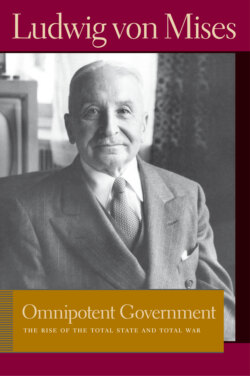Читать книгу Omnipotent Government - Людвиг фон Мизес - Страница 23
На сайте Литреса книга снята с продажи.
3. The Liberals and Militarism
ОглавлениеThe lower chamber of the Prussian Parliament, the Abgeordnetenhaus, was based on universal franchise. The citizens of every constituency were divided into three classes, each of which chose the same number of electors for the final poll by which the parliamentary representative of the constituency was elected. The first class was formed of those adult male residents who paid the highest taxes and together contributed one third of the total amount of taxes collected in the district; the second class of those who together contributed the second third, and the third class of those who together contributed the third third. Thus the wealthier citizens had a better franchise than the poorer ones of their constituency. The middle classes predominated in the ballot. For the Reichstag of the North German Federation, and later for that of the Reich, no such discrimination was applied. Every adult male cast his vote directly on the ballot which returned the representative of the constituency; franchise was not only universal but equal and direct. Thus the poorer strata of the nation got more political influence.
It was the aim of both Bismarck and Lassalle to weaken by this electoral system the power of the liberal party. The liberals were fully aware that the new method of voting would for some time sap their parliamentary strength. But they were not concerned about that. They realized that the victory of liberalism could be achieved only by an effort of the whole nation. What was important was not to have a majority of liberals within the chamber but to have a liberal majority among the people and thereby in the army. In the Prussian Abgeordnetenhaus the Progressives outnumbered the friends of the government. Nevertheless liberalism was powerless, since the King could still trust in the allegiance of the greater part of the army. What was needed was to bring into the ranks of liberalism those backward ignorant masses whose political indifference was the safeguard of absolutism. Only then would the day of popular government and democracy dawn.
The liberals therefore did not fear that the new electoral system would postpone or seriously imperil their inexorable final victory. The outlook for the immediate future was not very comforting but the ultimate prospects were excellent. One had only to look at France. In that country too an autocrat had founded his despotism upon the loyalty of the army and upon universal and equal franchise. But now the Caesar was crushed and democracy had triumphed.
The liberals did not greatly fear socialism. The socialists had achieved some success. But it could be expected that reasonable workers would soon discover the impracticability of socialist utopias. Why should the wage earners whose standard of living was daily improving be deluded by demagogues who—as rumors whispered—were on the pay roll of Bismarck?
Only later did the liberals become aware of the change taking place in the nation’s mentality. For many years they believed that it was only a temporary setback, a short reactionary incident which was doomed to disappear very soon. For them every supporter of the new ideologies was either misguided or a renegade. But the numbers of these apostates increased. The youth no longer joined the liberal party. The old fighters for liberalism grew tired. With every new election campaign their ranks became thinner; with every year the reactionary system which they hated became more powerful. Some faithful men still clung to the ideas of liberty and democracy, gallantly fighting against the united assaults on liberalism from the Right and from the Left. But they were a forlorn squad. Among those born after the battle of Königgrätz almost nobody joined the party of liberalism. The liberals died out. The new generation did not even know the meaning of the word.
